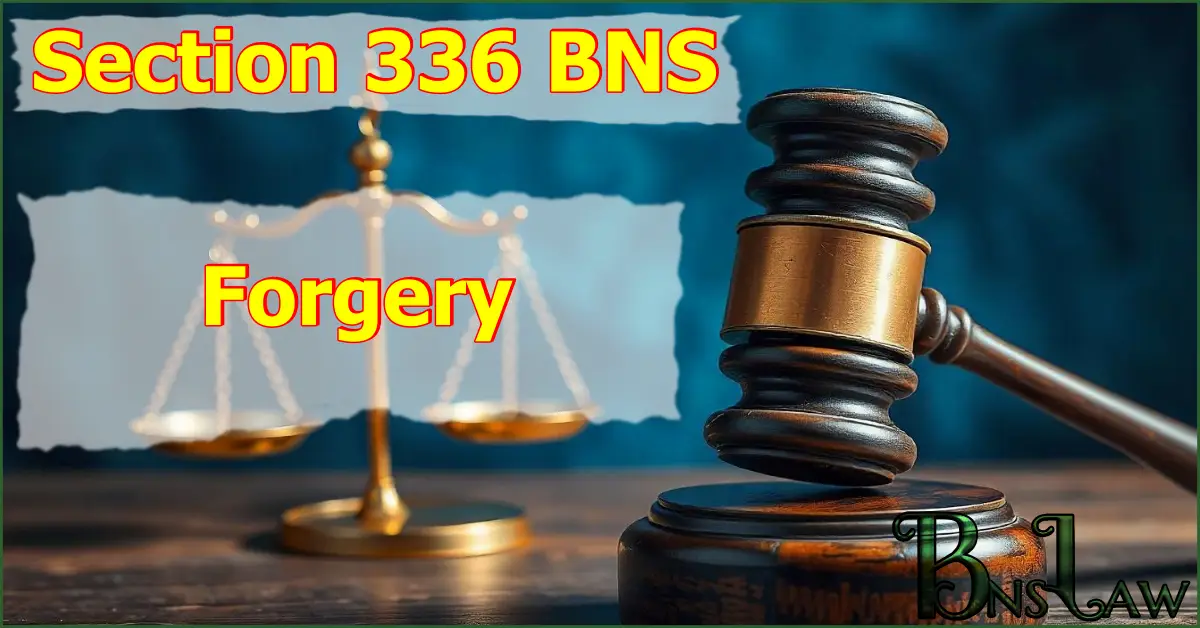Section 336 BNS | BNS 336
336(1) BNS
Whoever makes any false document or false electronic record or part of a document or electronic record, with intent to cause damage or injury, to the public or to any person, or to support any claim or title, or to cause any person to part with property, or to enter into any express or implied contract, or with intent to commit fraud or that fraud may be committed, commits forgery.
336(2) BNS
Whoever commits forgery shall be punished with imprisonment of either description for a term which may extend to two years, or with fine, or with both.
336(3) BNS
Whoever commits forgery, intending that the document or electronic record forged shall be used for the purpose of cheating, shall be punished with imprisonment of either description for a term which may extend to seven years, and shall also be liable to fine.
336(4) BNS
Whoever commits forgery, intending that the document or electronic record forged shall harm the reputation of any party, or knowing that it is likely to be used for that purpose, shall be punished with imprisonment of either description for a term which may extend to three years, and shall also be liable to fine.
READ OTHER SECTIONS OF CHAPTER XVIII — OF OFFENCES RELATING TO DOCUMENTS AND TO PROPERTY MARKS
FAQs of BNS Section 336
-
336 BNS punishment and fine
Punishment and fine under Section 336 of the BNS—
336(2): Imprisonment for 2 years, or fine, or both.
336(3): Imprisonment for 7 years and fine.
336(4): Imprisonment for 3 years and fine. -
336 BNS cognizable or not
The offence under Section 336 of the BNS—
336(2): Non-cognizable.
336(3): Cognizable.
336(4): Cognizable. -
336 BNS bailable or not
The offence under Section 336 of the BNS—
336(2): Bailable.
336(3): Non-bailable.
336(4): Bailable. -
336 BNS trial court
Offence specified in Sections 336(2), 336(3) and 336(4) of the BNS is triable by the Magistrate of the first class.
Important Points
- Cognizable Offences: These are offences where a police officer can arrest a person without a warrant.
- Non-Cognizable Offences: These are offences where a police officer cannot arrest a person without a warrant.
- Bailable Offences: These are offences where the accused can get bail from the police station itself. All bailable offences are listed in the First Schedule of the Bharatiya Nagarik Suraksha Sanhita (BNSS).
- Non-Bailable Offences: Offences in which bail is not granted directly from the police station but after hearing the case in the court, the judge decides when bail will be granted. All non-bailable offences are listed in the first schedule of the Bharatiya Nagarik Suraksha Sanhita (BNSS).
- In the above FAQ, “trial court” means the court that has jurisdiction to try the offence.
- In the above FAQ, the expression “Magistrate of the first class” and “Any Magistrate” does not include Executive Magistrates.
Read other Sections of the BNS
Reference Link: New Criminal Laws (BNS), Ministry of Home Affairs







